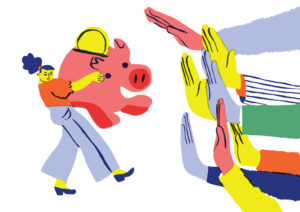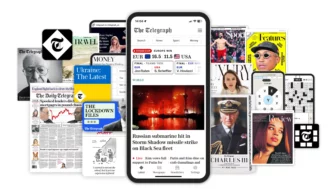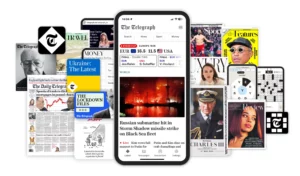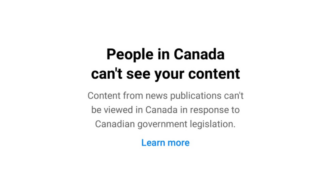
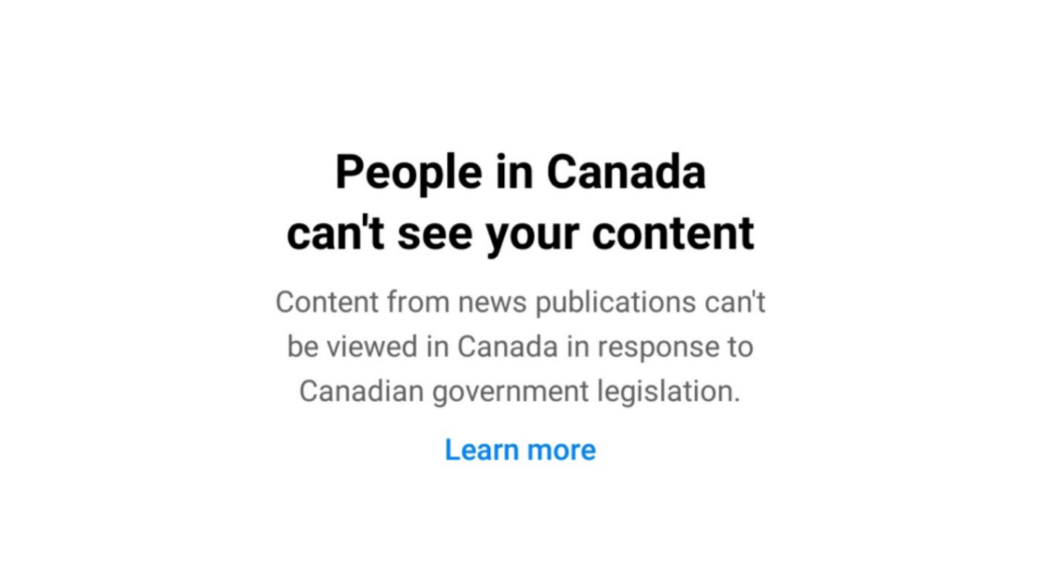
Written by Christophe Cluzel and Catherine Léger from Radio-Canada. Christophe, Radio-Canada’s Senior Director of Marketing Strategies, guides the teams in acquiring and retaining audiences, while Catherine, Senior Head of Digital Marketing, leads the teams responsible for digital marketing at Radio-Canada.
Summer 2023: the context and Bill C-18
In the summer of 2023, the Canadian media landscape was profoundly altered by the Online News Act (C-18). Aimed at ensuring fair compensation for Canadian media via royalties from major online platforms, this legislation was intended to redistribute millions of dollars a year to the Canadian news industry. However, in August 2023, Meta (including Facebook and Instagram) reacted with unexpected firmness, refusing any negotiations and deciding instead to block access to news content on its platforms in Canada.
Overnight, for Radio-Canada, Canada’s public broadcaster, a social ecosystem on Meta, including more than 106 Facebook accounts and 63 Instagram accounts, were paralyzed, making content inaccessible. The unilateral decision deprived the 83% of French-speaking Canadians who come to the Radio-Canada platform daily from the community and content they consume via these pages.
It’s a cataclysm for all media. The loss of Meta as a traffic referent is critical for certain media, particularly local ones, and affects their chances of survival in an environment where competition has never been on a level playing field. Since then, according to the Canadian Digital Media Research Network, over 212 local media outlets – some 30% of those previously active on social media – are now inactive, having an impact far beyond just the business itself.
Reactivity and a strategic adaptation
Faced with this unprecedented situation, Radio-Canada needed to react quickly to adjust its broadcasting, distribution and marketing strategies on social platforms. As a public medium and key information player, it’s imperative to establish clear guidelines to maintain a solid and direct connection with readers, despite the blockage. In the same vein, and because “buying is voting”, CBC/Radio-Canada also ceased all investment in the platform. Meta’s actions are worrying because they restrict access to reliable local sources of information for Canadians, particularly those in the North, in French-speaking minority communities, and in rural areas. In response, we have joined other news publishers and broadcasters in filing a complaint with the Competition Bureau.
The immediate impact on overall traffic was relatively low, thanks in part to the acquisition of new audiences for our RC Info and RC Ohdio applications. For four years now, as a result of algorithmic changes, we have been observing a gradual and marked decline in referral traffic from Meta, which at its peak accounted for a significant proportion of traffic before 2021. This downward trend accelerated, reaching 0% in the summer of 2023 at the time of the block. The duplication of visitors between our Facebook pages and our website also played a mitigating role, indicating that a portion of users were already diversifying their sources of information.
An offensive campaign and things looking up
To counter the effect of the Meta blocking, Radio-Canada has launched several offensive advertising campaigns starting in July 2023. Clear, direct messages were broadcast to encourage users to find their information directly on our digital platforms. Among the slogans used: “Don’t wait for someone to block access to your local news” and “Download the Radio-Canada Ohdio app”.
The results of these campaigns were impressive. Between July 3rd and September 3rd, the RC Info app recorded a 166% increase over the previous period. The RC Ohdio app, meanwhile, saw an 83% increase in downloads. These figures, combined with increased visibility on our websites, show that our reorientation strategy has paid off.
Anonymous-to-known: prioritizing reader authentification across platforms
With the urgent need to maintain a direct link with our audiences, the organization has realized the importance of leveraging content consumption on our owned web and apps spaces. The major loss of digital assets on Meta, via the freezing of pages, only amplifies this desire for independence.
Having top-quality, activatable first-party data, in addition to in-depth knowledge of our audiences, was already on the radar and identified as a high-value strategic action, particularly in the wake of the “cookie apocalypse”… which ultimately won’t happen as we thought it would. The blocking of Meta in Canada only highlights the need to accelerate this shift.
As a result, a vast strategy of mandatory authentication. Registration, i.e. account creation and login, across all Radio-Canada Group applications, was developed and rolled out in July 2024 to accompany the Paris Olympics.

With this move, Radio-Canada becomes the first public broadcaster to require authentication on its flagship news app product, notably out of a public service conviction that by being in control of our data, it is possible to manage it more responsibly and ethically than any major global player, while offering a more personalized and engaging experience.
At the time of writing, Radio-Canada has just passed the milestone of 2.6 million citizen accounts, representing an unrivalled digital asset and enabling the organization to maintain a privileged and direct link, without intermediaries, with its audiences.
Analyzing the long-term impact
One year after Meta was blocked, analyses show that the impact on our overall traffic has remained under control. The loss of traffic from Facebook had begun well before summer 2023, but direct visits, notably to our apps, and those from search engines have increased, more than offsetting the decline.
In addition, diversifying advertising investments towards other platforms such as TikTok, Google, Amazon, Reddit, Snapchat, to name but a few, has enabled us to capture a younger audience by embedding more on their daily platforms, while maintaining engagement with our products through direct consumption. But it’s not just American platforms. The stalemate has also enabled us to reassess our contribution to the media ecosystem and set more ambitious targets for Canadian investment, particularly in local media, as well as re-evaluating our buying methods in order to keep as much of the investment as possible in publishers’ pockets.
It just goes to show that there are no small gestures, and that we need to stand united against these digital giants.
Towards redefining our relationship with social media platforms
Today, as the impact of the Meta blockage continues to dissipate, Radio-Canada is resolutely looking to the future. The redefinition of our relationship with social media is underway, and we are pursuing our mission to inform the Canadian public while adapting our strategies to meet the challenges of an ever-changing digital landscape.
To put it another way, existing outside a mass medium like Meta is a bit like taking an unpleasant-tasting medicine to cure an illness. It’s not pleasant at first, but it’s necessary to regain your health and feel better in the long term. Even if the move was abrupt, we have to admit that it was probably the best scenario for breaking free and reinventing oneself.
As we continue to evolve in this new world, fundamental questions arise for the future of our democracy
How can we preserve a healthy public space where truth and informed debate prevail? Where do we draw the line between freedom of expression and state control in a democracy living in the digital age? How can we regulate platforms that know no borders, to avoid undue manipulation of information?
What is ethical responsibility in the digital world? How can we get the technology giants to assume their responsibility towards society in the same way as other media?
What does it mean to inform and be informed in 2024? In a world where anyone can become a media outlet, where the boundaries between content and source are blurring, and where the definition of information is increasingly subjective, the role of the media is undergoing a radical transformation. How can we reinvent dialogue to overcome the prevailing mistrust and win back the trust of citizens?
At Radio-Canada, we are exploring various initiatives to address these issues and continue to fulfill our mandate: to inform, enlighten and entertain French-speaking audiences across the country. Through these efforts, we are committed to staying close to our audience, while adapting our approach to evolving uses and new audience expectations.







